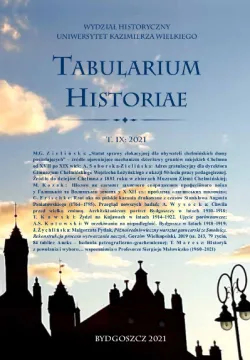”Statute of the Elocation Case for Chełmno Citizens who Own Houses” – a Source Revealing the Mechanism of the Lease of Chełmno Municipal Land from the 17th to the 19th Century
DOI:
https://doi.org/10.34767/TH.2021.09.01Keywords:
Chełmno, XVII‒XIX wiek, historia miast, źrodłoznawstwoAbstract
The term elocation probably derives from the Latin word eloco, meaning to rent. It refers to the allocation process characteristicof Chełmno for townspeople, owners of houses and empty squares in the city, land outside the city. The purpose of this allocation was to give the townspeople the opportunity to obtain additional income enabling the maintenance of already existing houses and the development of empty squares in good condition. The income from leased land was also supposed to secure the property in the event of natural disasters and damages. The first elocation was carried out in 1602, the next ones took place every fifty years. For the elocation of 1852, its statute was preserved, showing the mechanism of allocating land to townspeople not only in the mid-nineteenth century.

